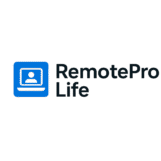
The dream of working from anywhere—a cozy home office, a beachside cafe, or a mountain retreat—is more achievable than ever in 2025. The remote work revolution isn’t just a trend; it’s a fundamental shift in how the world operates. But with this opportunity comes a challenge: how do you sift through the noise to find legitimate, high-quality remote jobs that align with your career goals?
You’ve come to the right place. This guide cuts through the clutter to bring you the top 10 remote job platforms in 2025, meticulously curated to help you find not just any job, but the right job. We’ll explore the unique strengths of each website and provide expert tips to optimize your search.
The 2025 Remote Work Landscape: Why Choosing the Right Platform Matters
Before we dive in, it’s crucial to understand the new dynamics of remote work. Hybrid models are standard, async-first communication is on the rise, and companies are now hiring from a truly global talent pool. This means competition is fierce, but opportunities are boundless. Using a specialized platform is no longer a luxury—it’s a necessity. These sites vet employers, aggregate the best listings, and provide tools tailored for the digital nomad, the career climber, and the flexible freelancer alike.
Before we dive in, it’s crucial to understand the new dynamics of remote work. Hybrid models are standard, async-first communication is on the rise, and companies are now hiring from a truly global talent pool. This means competition is fierce, but opportunities are boundless. Using a specialized platform is no longer a luxury—it’s a necessity.
These sites vet employers, aggregate the best listings, and provide tools tailored for the digital nomad, the career climber, and the flexible freelancer alike. If you’re new to this lifestyle, check out our guide on time management tips for remote workers.
The Top 10 Remote Job Platforms to Power Your Career in 2025

1. FlexJobs
Best For: Vetted, 100% scam-free listings and professional career resources.
A pioneer in the remote work space, Flex job has maintained its gold-standard reputation by manually screening every single job posting. While it operates on a subscription model, the small fee is a worthwhile investment to avoid wasting time on scams or low-quality leads.
· Why it’s a Top Choice for 2025: Their commitment to quality has only intensified. They now offer advanced filtering for “Async-Friendly” companies and roles with specific digital tool requirements (e.g., “Slack-first” or “Notion-native”).
· Pros: Extremely high-quality, scam-free listings; excellent career resources like skills tests and webinars; includes full-time, part-time, and freelance gigs.
· Cons: Requires a paid subscription ($7.50 – $21.95 per month).
· Ideal For: Professionals at all levels who value quality and security over a purely free service.
2. LinkedIn
Best For: Networking your way into a remote role and leveraging your professional brand.
LinkedIn is far more than a social network; it’s a powerful job search engine. Its key advantage is the ability to research companies, connect with hiring managers directly, and showcase your professional narrative.
· Why it’s a Top Choice for 2025: Enhanced AI-powered job matching and the “Open To Work” feature now include specific remote-work preferences visible only to recruiters. The rise of video posts and digital storytelling makes it easier to demonstrate your expertise.
· Pros: Massive volume of listings; powerful networking capabilities; free to use for basic job search.
· Cons: Can be overwhelming; requires active profile management and networking to stand out.
· Ideal For: Almost everyone, but especially those in corporate, tech, sales, and marketing roles who understand the power of personal branding.
3. We Work Remotely
Best For: High-quality, curated tech and non-tech remote jobs from renowned companies.
As one of the largest remote-only job boards, We Work Remotely attracts top-tier companies like Google, Amazon, and Spotify. The site is beautifully simple, focusing exclusively on remote opportunities across various categories.
· Why it’s a Top Choice for 2025: It has expanded beyond its tech roots to become a hub for all professional fields, including Marketing, Customer Support, Design, and more. Their strict posting guidelines ensure a high standard.
· Pros: Clean, user-friendly interface; high-quality companies; free for job seekers.
· Cons: Less personalized than other platforms; you can’t create a profile for employers to find you.
· Ideal For: Developers, designers, marketers, and customer support pros looking for roles at well-known companies.
4. Remote.com
Best For: Finding a job with a company that has a mature, remote-native culture.
Remote.com is both an employer-of-record service (for companies) and a fantastic job board (for you). They specialize in roles from companies that are built for remote work from the ground up, often offering competitive global salaries and benefits.
· Why it’s a Top Choice for 2025: Their “Remote Culture” index for listed companies gives you insight into their async policies, meeting culture, and benefits before you even apply.
· Pros: Focus on companies with strong remote infrastructures; often features jobs with transparent salary bands.
· Cons: The job board is newer than others, so volume can vary by category.
· Ideal For: Those who prioritize company culture and want to work for organizations that truly understand remote work.
5. Dynamite Jobs
Best For: A personalized, human-curated job search experience.
Dynamite Jobs takes a hands-on approach. They not only aggregate great remote jobs but also offer career coaching and resume reviews. Their newsletter is a fantastic resource for discovering new opportunities delivered directly to your inbox.
· Why it’s a Top Choice for 2025: Their curation is exceptional. Each listing is reviewed by their team, and they focus on companies that are great to work for, not just those that are hiring.
· Pros: Carefully vetted listings; helpful career resources; free for job seekers.
· Cons: Smaller volume of postings compared to massive boards like LinkedIn.
· Ideal For: Job seekers who appreciate quality over quantity and want additional career guidance.
6. AngelList Talent (Now Wellfound)
Best For: Finding remote roles at fast-growing startups.
If you want to work in a dynamic, innovative environment, AngelList (rebranded as Wellfound) is the place to be. It connects talent with startups, from brand-new ventures to established unicorns. A key feature is the ability to see salary and equity details upfront.
· Why it’s a Top Choice for 2025: The platform has perfected the matching process for startup culture. You can create a profile detailing your preferred tech stack, work style, and compensation expectations to attract founders.
· Pros: Transparent compensation details; direct access to founders and hiring managers; strong focus on tech and product roles.
· Cons: The fast-paced startup environment isn’t for everyone.
· Ideal For: Software engineers, product managers, growth hackers, and anyone passionate about building something new
7. Working Nomads
Best For: The digital nomad who wants curated job alerts.
Working Nomads does the hard work for you. They scour the web for the best remote jobs and deliver them in a daily or weekly email digest. This saves you countless hours of browsing and allows you to discover opportunities on smaller company websites.
· Why it’s a Top Choice for 2025: Their curation algorithms have gotten smarter, allowing for highly specific email alerts based on your exact skills and preferences.
· Pros: Saves time; great for discovering “hidden” jobs; free email subscription.
· Cons: You are taken to external sites to apply, so the experience isn’t centralized.
· Ideal For: Developers, designers, and writers who want a hands-off, automated way to discover new opportunities.
8. Remote OK
Best For: Developers and tech professionals seeking a vast array of opportunities.
Remote OK is a straightforward, no-frills job board that has been a staple in the remote community for years. It boasts a massive database of remote jobs, with a very strong showing in programming, DevOps, and design.
· Why it’s a Top Choice for 2025: It remains one of the highest-traffic remote job boards, meaning a constant stream of new postings. The interface is simple and functional.
· Pros: Huge volume of new jobs daily; simple search functionality; free to use.
· Cons: Less vetting than other platforms, so due diligence on companies is advised.
· Ideal For: Tech professionals who want to see a high volume of new postings daily.
9. Himalayas
Best For: Exploring remote companies and finding jobs with salary transparency.
Himalayas is a remote-focused company database and job board. Its standout feature is the insistence on salary transparency—every job posted must include a salary range. This empowers you to only apply for roles that meet your financial expectations.
· Why it’s a Top Choice for 2025: The demand for pay transparency is a major trend, and Himalayas is leading the charge in the remote space. Their company profiles are incredibly detailed.
· Pros: Mandatory salary transparency; focus on company culture and tools; clean design.
· Cons: Smaller number of listings than larger aggregators.
· Ideal For: Any professional who values transparent compensation and wants to deeply research potential employers.

10. Upwork / Fiverr
Best For: Freelancers and contractors to build a client base and proon ct-based income.
While not traditional job boards, these freelance marketplaces are powerhouse platforms for finding remote work. They allow you to create a profile, showcase your portfolio, and bid on projects from clients worldwide.
· Why it’s a Top Choice for 2025: The gig economy is stronger than ever. Upwork and Fiverr have robust systems for secure payments, dispute resolution, and building long-term client relationships.
· Pros: Unlimited earning potential; total control over your workload and clients; great for building a diverse portfolio.
· Cons: Can be highly competitive; requires self-promotion and business management skills; platforms take a fee.
· Ideal For: Freelancers, writers, designers, programmers, consultants, and virtual assistants.Fiverr
If you’re planning to succeed here, check our guide on building a strong online portfolio
Pro Tips for Landing Your Remote Job in 2025
1. Tailor Your Resume for ATS (and Humans): Use keywords from the job description. Highlight results and quantify your achievements (e.g., “Increased organic traffic by 45%”).
2. Master the Remote Interview: Test your tech (camera, microphone, internet) beforehand. Prepare examples that demonstrate your self-motivation, communication skills, and time management.
3. Showcase Your Digital Proficiency: Mention your familiarity with key tools like Slack, Zoom, Asana, Trello, Notion, etc.
4. Ask Insightful Questions: Inquire about the company’s remote culture, communication practices, and how they foster team connection. This shows you’re thinking like a remote native.
5. Beware of Scams: Never pay to apply for a job. Be wary of offers that seem too good to be true or involve receiving and sending money. Research the company thoroughly.
Frequently Asked Questions (FAQ)
Q1: Are remote jobs typically paid less than office-based roles?
A:Not necessarily. In 2025, many companies offer location-agnostic salaries that are competitive on a global scale. Others may use location-based compensation. Platforms like Himalayas and Wellfound promote salary transparency, so you’ll know the range before you apply. The key is to research and negotiate based on your skills and experience, not just your location.
Q2: What are the most in-demand skills for remote jobs in 2025?
A:Beyond industry-specific skills (like software development or digital marketing), soft skills are crucial. These include:
· Async Communication: Writing clear, concise messages and updates.
· Digital Literacy: Proficiency with collaboration tools (Slack, Notion, Asana, etc.).
· Self-Motivation & Time Management: The ability to work independently and meet deadlines.
· Adaptability: Being comfortable with changing processes and tools.
Q3: How can I avoid remote job scams?
A:Be vigilant. Red flags include:
· Requests for Payment: You should never have to pay for a job or “training materials.”
· Poor Communication: Offers filled with grammatical errors or from unprofessional email addresses.
· Too Good to Be True: Vague job descriptions with unusually high pay for little work.
· Early Requests for Personal Info: Being asked for bank details or your social security number early in the process.
Stick to vetted platforms like FlexJobs and always research the company on LinkedIn and Google before engaging.
Q4: I’m new to remote work. Which platform is best for me?
A:Start with platforms that offer strong resources and vetting. FlexJobs is excellent for beginners due to its scam-free guarantee and career coaching resources. LinkedIn is also great for researching companies and understanding what skills are in demand.
Q5: How do I handle interviews across different time zones?
A:Flexibility is key. Use tools like World Time Buddy to find a mutually agreeable time. In your application, you can proactively mention your flexibility or specify your available working hours (e.g., “I am available to overlap with EST business hours”). Being accommodating but clear about your limits is appreciated by employers.

Final Thoughts: Your Remote Future is Calling
The journey to finding a fulfilling remote job in 2025 is a strategic one. It’s no longer just about finding any company that allows remote work; it’s about finding the right culture that empowers you to do your best work from anywhere. The platforms listed here are your gateways to that future.
Each platform offers a unique key to unlocking different doors—whether it’s the curated quality of FlexJobs, the vast network of LinkedIn, or the transparent startup world of Wellfound.
Your perfect remote role is more than a job listing; it’s a lifestyle choice. It represents autonomy, flexibility, and the freedom to design your life on your own terms. Use this guide as your compass. Create those profiles, tailor those resumes, and prepare for those interviews with confidence.
The world of work has changed forever, and it’s waiting for you to log on. Your remote future starts now.
What’s your favorite remote job platform? Share your success stories in the comments below!
